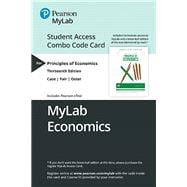NOTE: Before purchasing, check with your instructor to ensure you select the correct ISBN. Several versions of the MyLab™and Mastering™ platforms exist for each title, and registrations are not transferable. To register for and use MyLab or Mastering, you may also need a Course ID, which your instructor will provide.
Used books, rentals, and purchases made outside of Pearson
If purchasing or renting from companies other than Pearson, the access codes for the MyLab platform may not be included, may be incorrect, or may be previously redeemed. Check with the seller before completing your purchase.
For two-semester courses in the principles of economics.
This ISBN is for the MyLab combo card, which includes the MyLab access card, Pearson eText, and loose-leaf print edition (delivered by mail).
An introduction to the functioning of the economy and the power and breadth of economics
Reviewers tell us that Case/Fair/Oster is one of the all-time bestselling principles of economics texts because they trust it to be clear, thorough, and complete. Readers of Principles of Economics, 13th Edition come away with a basic understanding of how market economies function, an appreciation for the things they do well, and a sense of things they do poorly. With the latest research and added exercises, students begin to learn the art and science of economic thinking and start to look at some policy, and even personal decisions, in a different way.
Personalize learning with MyLab Economics
By combining trusted author content with digital tools and a flexible platform, MyLab personalizes the learning experience and improves results for each student.









